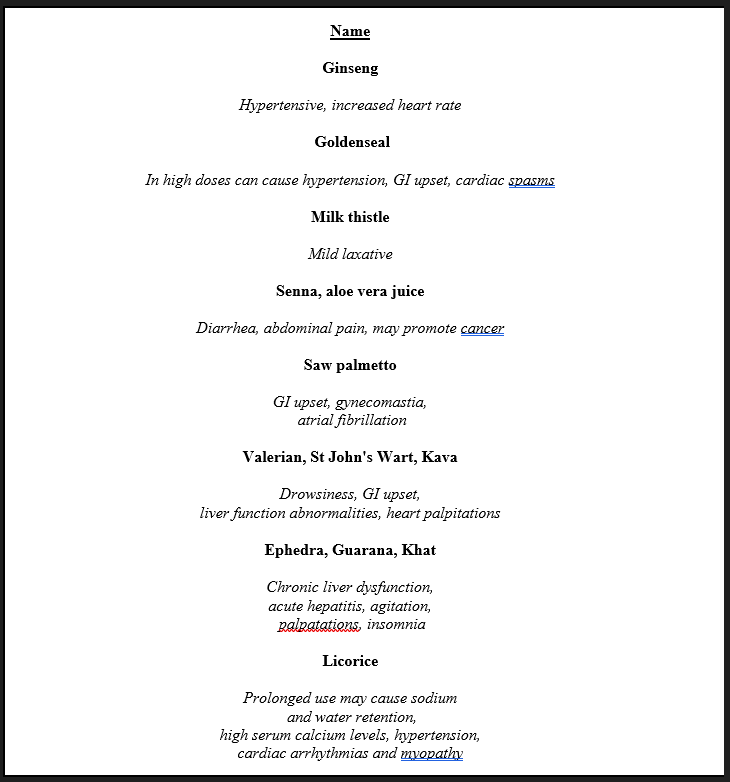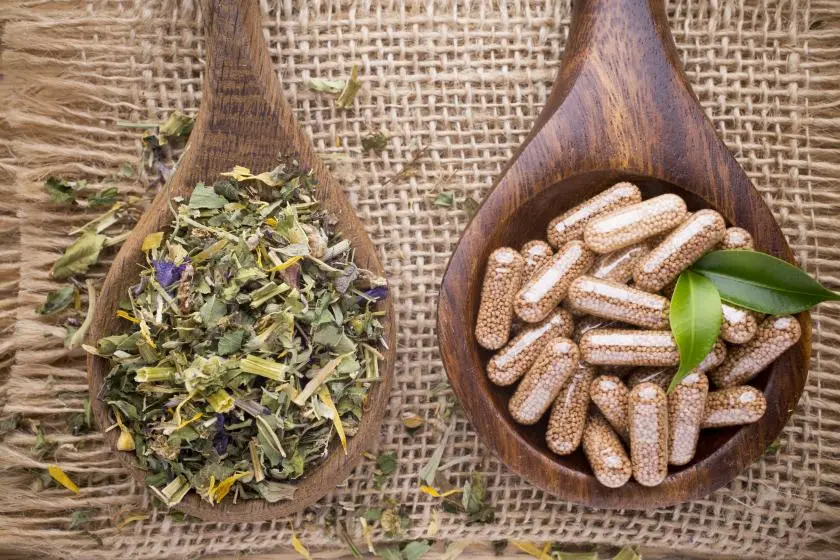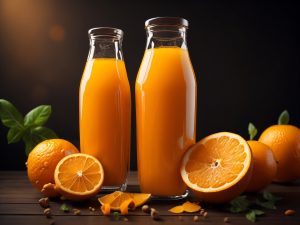Up to a quarter of adults in the United States use herbal supplements. It seems the common attitude towards herbal supplements is that if they are natural, they are safe. Most people I talk with have strong attitudes against artificial sweeteners because they are not natural, even after I explain that the bulk of research has shown artificial sweeteners to pose little harm (if you are curious about this topic, I covered it in this blog). These same people do not realize that artificial sweeteners are FDA-regulated and studied before their public release, while herbal supplements are not regulated and are not tested for safety.
I am not trying to knock herbal supplements or suggest that they are all dangerous. In fact, most of them are probably safe for most people. The major problem I have with herbal supplements is that they are not regulated and not tested for safety. Testimonials from people do not count as scientific evidence. I would also like to dispel the common belief that something is safe because it is natural. Many dangerous products are natural, like tobacco, for instance. Some natural products are dangerous, and some are safe. Some artificial products are dangerous, and some are safe. Each product or supplement should be evaluated individually to assess its safety.
As mentioned, there is not a lot of scientific research on the effectiveness or side effects of herbal supplements. I will try my best to use what little research is out there to draw conclusions about the aforementioned topics.
Herbs are labeled as food and not tested by the FDA
Herbs are classified as food in the United States. Because of this, they are not studied by the FDA for safety, nor do they have to follow certain practices to make sure the herbal supplements are standardized and similar to all similar supplements produced by different companies. Ginseng from one company can be completely different from ginseng from another company due to processing methods, strength used, quality of herb used, storage, soil quality, maturity of herb used, and contaminants found in the product (1). Without stringent testing requirements, there will always be great diversity for the same herbal supplement between different companies and even within the same companies. You really never know what you are getting unless it is verified by an independent lab.
Herbal stimulants
One of the most dangerous and well-studied herbs are herbal stimulants. I am sure most of you have seen the commercials with people talking about how much weight they lost while taking an herbal stimulant like ephedra. Ephedra was a popular weight-loss supplement for a long time. Popular until it was considered dangerous and banned in the United States in 2004. Ephedra was linked to dozens of cases of negative cardiovascular events like stroke, myocardial infarction, and even death (2). Quick to react, many herbal stimulant companies replaced ephedra with bitter orange.
Bitter Orange
Bitter orange is found naturally in citrus fruits such as oranges and grapefruit (3). The primary weight-loss supplement in bitter orange is p-synephrine. Some reports, including those from the FDA, have implicated bitter orange in causing cardiovascular and other health hazards.
The main problem with all of these reports is that supplements containing bitter orange usually contain other herbal products as well, so drawing causation from just bitter orange is difficult (4). Bitter orange is considered dangerous because its active ingredient, p-Synephrine, is structurally similar to ephedrine and ephedrine derivatives. Bitter orange gets a bad reputation because scientists generalize the known negative cardiovascular effects caused by ephedrine to p-Synephrine. If I learned anything in biochemistry, it is that structurally similar chemicals may exhibit completely different effects on the human body. A change in the placement of a molecule can drastically alter the action of the chemical.
It seems, at least for now, that p-Synephrine does not behave like ephedrine and does not increase the risk for negative cardiovascular activities. Almost all reports of bitter orange-causing deaths, even those released by the FDA, were not able to solely blame citrus oranges (4). Perhaps citrus orange is dangerous. Perhaps it is not. For now, there is no strong evidence linking p‐Synephrine or citrus orange to higher mortality rates or an increase in cardiovascular events. Almost all of the evidence against p‐Synephrine is based on the incorrect assumption that it behaves like ephedra.
The longest study to date (60 days) using bitter orange extract found that ingestion of 98 mg of p-Synephrine per day for 60 days led to no difference in heart beat, blood pressure, or changes in heart or kidney functioning compared to the control group (3). Longer testing of bitter orange would help us learn if it does actually produce negative cardiovascular effects.
Contamination of herbal supplements
Contamination of herbs with metals, toxins, prescription drugs, etc. can result from intentionally putting cheaper products into the supplement or from contamination during the processing of the herb. Most of the studies that I have read on this topic found that the most commonly contaminated herbal supplements come from Chinese medicine (5).
One large systematic review I came across 26 reviews to analyze to find the most commonly contaminated herbs and the most common sources of contamination. This review was very long, so I will just highlight the findings. The following contaminants were the most commonly found: prescription drugs, parasites, toxins, heavy metals like lead and mercury, pesticides, and other toxic chemicals (5). Some contaminated herbal supplements included Chinese traditional remedies, St. John’s wort, kava, aloe vera, Panax ginseng, Ginkgo biloba, and spearmint, among many others. They did not say what percentage of herbal supplements were found to be contaminated, although they did say contamination of herbal supplements was fairly common (not sure how they define common).
A study that examined the purity of 44 different herbal supplements found the following contaminants: senna, feverfew, and black walnut. This can be dangerous as senna acts as a laxative; feverfew can cause swelling and numbness of the mouth and oral ulcers, not to mention interactions with certain medications; and black walnut can be an allergy risk for those with nut allergies. The unlabeled fillers found in the study were soy and a wheat derivative. This is a problem, as some people are allergic to soy and some follow a gluten-free diet.
Mislabeling
There are not many scientific studies looking at the mislabeling of herbal products, but it is generally estimated that about 14–33% of herbal products are mislabeled (containing ingredients not listed on the label) (6). Whether or not companies purposely mislabel their products or if it is a result of contamination is unknown. This is why it is a good idea to buy herbal supplements that have their ingredients checked by an independent laboratory.
Using DNA barcoding to test purity of herbal supplements
A new technology is emerging called DNA barcoding, which is an accurate way to measure the purity of herbal products (6). It is a very sensitive measure and looks at gene sequences to determine the identity of different herbs.
A study using DNA barcoding to assess the purity of 44 herbal supplements from various companies found that 59% of the herbal products tested contained ingredients that were not listed on the labels. About 7 out of 44 (15%) of the herbal supplements contained contaminants and/or fillers that were not listed on the product label. About 75% of all products tested contained at least some of the authentic herbs listed, but only 2 of the 12 companies offered authentic products without any contaminants, fillers, or substitutions. Out of 44 herbal supplements tested, 32% contained product substitutions.
Another study used DNA barcoding to measure the purity of various herbal and commercial tea products (7). It was found that the listed ingredients were not found in 35% of herbal teas and 4% of commercial teas. The most common product not on the label was chamomile. St. John’s Wort tea contained different species of fern plants. Using different tea types not listed on the label may not seem like a big deal, but some herbal teas have pharmacologically active compounds that have caused serious injury or death due to overdose or allergic reactions. A different study found that half of the samples labeled as Korean ginseng turned out to be American ginseng (8).
Can herbal supplements cause liver and/or kidney damage?
The most common dangers associated with herbal supplements found in the literature were related to kidney and liver problems. Pretty much every study I looked at (about 30) that linked herbal supplements to liver injury relied on a few individual cases, or at most 50 cases, over the course of a few years. When the cases were investigated, it was nearly impossible to link one herbal supplement to a liver injury, as most of the people were taking a combination of different herbal supplements. Much of the other evidence comes from rat studies, in vitro studies, and in vivo studies. Scientists have theories about why certain herbs would cause liver damage, but simplified cause-and-effect mechanisms usually behave differently outside the lab when a person’s genes, diet, health status, gender, stress level, age, etc. are taken into account.
Another problem with trying to prove a cause-and-effect relationship between herbal supplement use and kidney and/or liver damage is that the study would have to span years, possibly decades, which is impossible to do in the lab. If herbal supplements cause liver or kidney damage, that damage would likely result from decades of use of certain herbal supplements. The number of confounding variables we would have to take into account for such a long period of time would make drawing any definite conclusions about herbal supplement use and liver or kidney damage nearly impossible.
Underreporting of herbal supplement side effects
If people experience an unwanted side effect, they will most likely discontinue taking the herb and not bother going to the doctor to report it. Some people may not even realize that the herbal supplement is causing the side effects. Because of this, most negative effects from herbal supplements will never be reported, thus causing a great underestimation of the negative effects of herbal supplements.
Complications from taking multiple herbal supplements together
As many pharmaceuticals are derived from herbal products, it should follow suit that taking a combination of different herbal products should be discouraged, as it is when taking multiple pharmaceutical drugs together, known as polypharmacy. This refers to the fact that combining different medications sometimes results in an effect different from what is seen from each individual medication. They may produce an adverse effect, a stronger effect, or an effect we cannot predict by looking at how each medication works by itself.
Chart of adverse reactions from common herbal supplements
(9), (10)

Discussion
I knew before starting this blog that there would be very few scientific studies researching the side effects or dangers of herbal supplements. As they are not regulated by the FDA, any studies would likely have to be paid for by the company, which is not likely to happen. We may never actually know whether or not herbal supplements are dangerous. Personal accounts of negative health effects from herbs amount to a few dozen people a year, people who may be more susceptible than the general population to side effects from the herb. Another major problem is that most people take more than one herbal supplement at a time, so finding out which supplement causes the problem is difficult.
The major question that must be asked is whether or not herbal supplements actually do what they are intended to do. This is another area likely to have few scientific studies. If the supplements do not work and there is a possibility of a side effect, obviously we should not take them. Instead of measuring the side effects of herbal supplements, we should study whether or not they work. Finding out which supplements do not work would likely do more to reduce the intake of possibly dangerous herbs than trying to study their side effects.
I was actually most surprised to find out how often herbal supplements are mislabeled and contaminated. Since they are not tested by the FDA, and since many come from China or other faraway countries, companies have little incentive not to use cheaper ingredients not listed on the label. When products are contaminated or mislabeled, it leads to a greater risk of a side effect, not to mention that the herbal supplement will not work as intended since it does not contain the listed ingredient. Lastly, since the supplement contains ingredients not listed, it would be impossible to find out which particular ingredient is causing the side effect.
After doing this blog, I would not take herbal supplements unless they were totally necessary. And if I did, I would make sure they were independently tested and verified. I hope this blog helps people realize that herbal supplements are not safe just because they are natural. It is likely that many herbal supplements do not even work. We cannot rely on people telling us that they work for them. Without controlled studies, we are going by unreliable testimonials. If you must take herbal supplements, stick with individual supplements and avoid supplements that have a few ingredients in them. This way, if you have a negative reaction, you can figure out which supplement is causing it.
So, which supplement brands do I recommend? None, as of now. I will do a blog where I talk about how to find pure supplements and brands that you can trust. Until then, try to buy supplements grown in the United States that are standardized. Like always, if you have any questions, leave a comment or email me from the contact page.
Sources
- Barnes, J. (2003). Pharmacovigilance of herbal medicines. Drug Safety, 26(12), 829-851.
- Cohen, P. A., & Ernst, E. (2010). Safety of herbal supplements: a guide for cardiologists. Cardiovascular therapeutics, 28(4), 246-253.
- Kaats, G. R., Miller, H., Preuss, H. G., & Stohs, S. J. (2013). A 60day double-blind, placebo-controlled safety study involving Citrus aurantium (bitter orange) extract. Food and Chemical Toxicology, 55, 358-362.
- Stohs, S. J., Preuss, H. G., & Shara, M. (2011). The Safety of Citrus aurantium (Bitter Orange) and its Primary Protoalkaloid p‐Synephrine. Phytotherapy Research, 25(10), 1421-1428.
- Posadzki, P., Watson, L., & Ernst, E. (2013). Contamination and adulteration of herbal medicinal products (HMPs): an overview of systematic reviews. European journal of clinical pharmacology, 69(3), 295-307.
- Newmaster, S. G., Grguric, M., Shanmughanandhan, D., Ramalingam, S., & Ragupathy, S. (2013). DNA barcoding detects contamination and substitution in North American herbal products. BMC medicine, 11(1), 222.
- Stoeckle, M. Y., Gamble, C. C., Kirpekar, R., Young, G., Ahmed, S., & Little, D. P. (2011). Commercial teas highlight plant DNA barcode identification successes and obstacles. Scientific reports, 1.
- Wallace, L. J., Boilard, S. M., Eagle, S. H., Spall, J. L., Shokralla, S., & Hajibabaei, M. (2012). DNA barcodes for everyday life: Routine authentication of Natural Health Products. Food research international, 49(1), 446-452.
- Elvin-Lewis, M. (2001). Should we be concerned about herbal remedies. Journal of Ethnopharmacology, 75(2), 141-164.
- Tovar, R. T., & Petzel, R. M. (2009). Herbal toxicity. Disease-a-month, 55(10), 592-641.





Here they sell a lot of this supplements. Omnilife, Herbalife etc… I’ve always had my doubts about them. I guess this post answers a lot of this questions.
Nice again reading you.
Hey Bernal. I was a bit surprised when writing this blog as well. You have to be very selective about the brand of herbal supplements you buy. I am going to write a blog about that later on though. I will let you know when I post it. Thanks for the comment!
This post made me realize a lot on natural herb products, found it very informative. I was one from the bunch that though that all herb supplements were safe and good for you. Guess you just have to be informed which ones to buy.